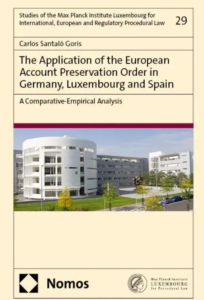Views
The Public Law-Private Law Divide and Access to Frozen Russian Assets
By Csongor István Nagy, Professor of Law at the University of Galway, Ireland, and at the University of Szeged, Hungary, and research professor at the HUN-REN Center for Social Sciences, Hungary.
The overwhelming majority of the international community condemned Russia’s war against Ukraine as a gross violation of international law and several countries introduced unilateral measures freezing Russian assets. It has been argued that countries should go beyond that and use these assets for the indemnification of Ukrainian war damages. Confiscation would, however, be unprecedented and raise serious international law concerns. While states have, with good reason, been reluctant to react to one wrongful act with another, this question has given rise to intensive debate. Recently, the EU authorized the use of net profits from the frozen assets but not the assets themselves to support Ukraine.
Tesseract: Don’t Over-React! The High Court of Australia, Proportionate Liability, Arbitration, and Private International Law
By Dr Benjamin Hayward
Associate Professor, Department of Business Law and Taxation, Monash Business School
X: @LawGuyPI, @MonashITICL
On 7 August 2024, the High Court of Australia handed down its long-awaited decision in Tesseract International Pty Ltd v Pascale Construction Pty Ltd [2024] HCA 24. The dispute arose out of a domestic commercial arbitration seated in South Australia, where the Commercial Arbitration Act 2011 (SA) is the relevant lex arbitri. That Act is a domestically focused adaptation of the UNCITRAL Model Law on International Commercial Arbitration (with its 2006 amendments).
The respondent to the arbitration sought to rely upon proportionate liability legislation found in the Law Reform (Contributory Negligence and Apportionment of Liability) Act 2001 (SA) and in the Competition and Consumer Act 2010 (Cth). The High Court was asked to determine whether those proportionate liability regimes could be applied in the arbitration. A very practical difficulty arose here, reflected in Steward J noting (in dissent) that the High Court was ‘faced with an invidious choice’: see [228]. Were the proportionate liability laws not to apply in the arbitration, the respondent might find themselves liable for 100% of the applicant’s loss, when they would not be liable to that same extent in court proceedings applying the same body of South Australian law. But were the proportionate liability laws to apply, the applicant might find themselves able to recover only a portion of their loss in the arbitration, and might then have to then pursue court proceedings against another third party wrongdoer to recover the rest: given that joinder is not possible in arbitration without consent. Read more
News
CoL.net Virtual Roundtable on the Commission’s Brussels Ia Report
In light of the Commission’s report on the Brussels Ia Regulation (first discussed here by Xandra Kramer), ConflictofLaws.net will be hosting an ad-hoc virtual roundtable
on Tuesday, 8 July 2025, 12pm–1.30pm (CEST).
The conversation will focus on the report published by the Commission on 2 June and its implications for a possible future reform of the Regulation.
The event will feature the following panellists:
Andrew Dickinson
University of Oxford
Stefano Dominelli
University of Genoa
Pietro Franzina
Catholic University of the Sacred Heart, Milan
Thalia Kruger
University of Antwerp
Tobias Lutzi
University of Augsburg
Everyone interested is warmly invited to join via this Zoom link.
Bridging Legal Systems: A Comparative-Empirical Study on the European Account Preservation Order by Dr. Carlos Santaló Goris
 Warmest congratulations to Dr. Carlos Santaló Goris on the publication of his book, The Application of the European Account Preservation Order in Germany, Luxembourg and Spain. A Comparative-Empirical Analysis (Nomos, 2025).
Warmest congratulations to Dr. Carlos Santaló Goris on the publication of his book, The Application of the European Account Preservation Order in Germany, Luxembourg and Spain. A Comparative-Empirical Analysis (Nomos, 2025).
This scholarly work offers a timely and much-needed exploration of the European Account Preservation Order (EAPO), the first cross-border civil interim measure at EU level. Conceived to enable the provisional attachment of debtors’ bank accounts across Member States, the EAPO aspires to procedural uniformity. Yet, as this study so lucidly demonstrates, its application remains deeply embedded in national procedural systems, giving rise to significant divergences and legal complexity.
With admirable clarity, analytical depth, and empirical rigour, Dr. Santaló Goris leads the reader through this intricate legal terrain. By examining, in particular, the operation of the EAPO in three distinct jurisdictions – Germany, Luxembourg, and Spain – his manuscript illustrates the practical challenges posed by procedural fragmentation while offering valuable guidance for navigating the instrument across legal systems.
This manuscript stands out as a thoughtful and impactful contribution to the field of European civil procedure. What distinguishes it most is its remarkable ability to bridge legal theory and judicial practice. Through a combination of comparative analysis, stakeholder perspectives, and data-driven insights, it offers a comprehensive and balanced account of how the European Account Preservation Order operates in practice, making it an indispensable resource for scholars, practitioners, and policymakers alike.
Congratulations, Carlos, on this well-deserved accomplishment!
More information on this book is available here.
Webinar on the 1996 Hague Child Protection Convention, 30 June & 1 July
|
This research project examines the legal framework for the cross-border protection of children, focusing on the 1996 Hague Convention on Jurisdiction, Applicable Law, Recognition, Enforcement and Co-operation in Respect of Parental Responsibility and Measures for the Protection of Children (‘the 1996 Hague Convention’).
|



